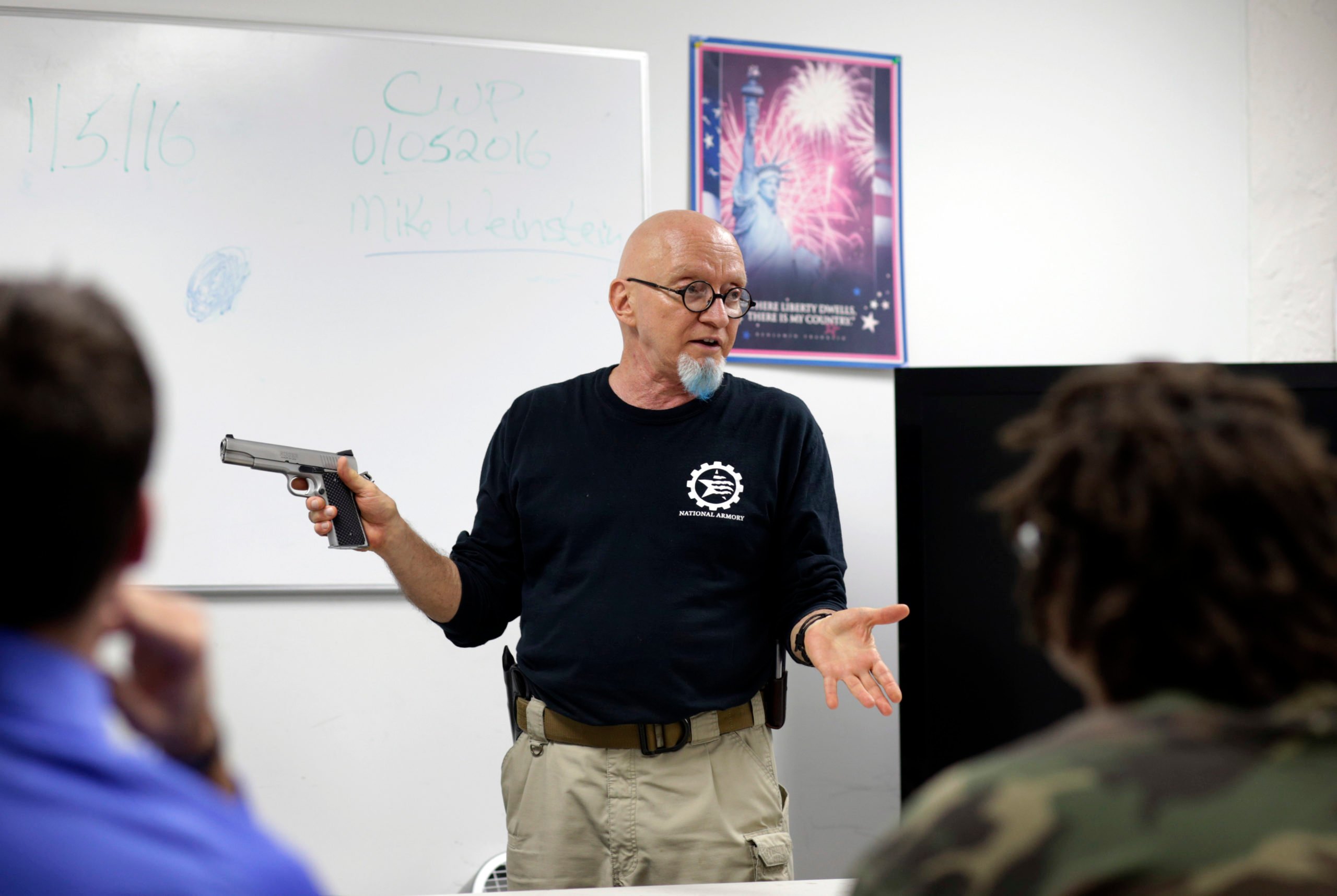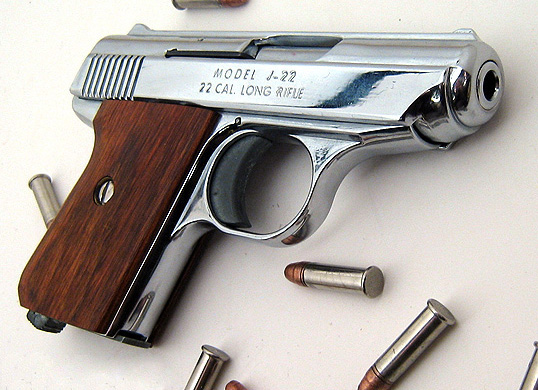In 2016, Florida’s Republican-dominated legislature strengthened the requirements to get a license to carry a concealed gun by mandating that each applicant discharge a firearm under the watchful eye of an instructor. The provision was affixed to a GOP-backed bill lowering the fees for a concealed weapon license, and celebrated as a victory by the state’s most powerful gun lobbyist, Marion Hammer.
But an informal survey of firearm instructors around the state by The Trace reveals that some do the absolute bare minimum to fulfill a “live fire” mandate, which requires them to witness a student fire a gun with ammunition that contains, among other things, gunpowder and a casing containing a primer. These trainers hold classes in hotel conference rooms instead of gun ranges and let students shoot nonlethal rounds, which don’t contain as much gunpowder as regular bullets. Certain training facilities, like S.F.T.R.U Firearms Training Academy in Fort Lauderdale, let students discharge a single .22-caliber round into a water tank to fulfill the live-fire portion of their training. The practices, while technically legal, seem to violate the spirit of the law. Firearms trainers told us that they are potentially leaving thousands of permit holders ill-equipped to carry a gun and shoot real bullets.
Robert Dee, a trainer in Polk County, reached out to us because he was frustrated by concealed carry instructors who skip proper range training. He told us about some hotel trainers who let students fire a .22-caliber bullet into a plastic pipe stuck in a bucket of sand. “In my considered opinion, thousands, if not tens of thousands, of Florida concealed weapon licenses have been issued to untrained people under false pretenses,” he said.
The market for firearms training in Florida is crowded, with hundreds of instructors throughout the state catering to the country’s largest population of concealed carriers. More than 2.5 million Floridians have a concealed weapon license, according to the most recent data from the state’s licensing division — more than any other state, by some estimates, and a more than 7,000 percent increase from 1988, when the state began issuing concealed weapon licenses.
Handgun instructors competing for clientele distinguish themselves by offering the fastest course for the lowest price. Split 2nd Training near Gainesville, which holds classes several times a week in hotels in Jacksonville, Tampa, Ocala, and the Orlando area, advertises firearm proficiency in three hours for $49 on its website. The classroom portion of the course includes a review of gun laws, like the state’s Stand Your Ground statute, as well as safe gun handling and self-defense techniques. Next to “state-required live fire” is a key selling point: “This will take place in the classroom, we will not have to leave.” A school called Florida Carry Class is offering a sale that’s even cheaper — $29.99, with the promise “We make it EASY!” Classes are held several times a week in hotels in Sarasota, Tampa, and the Fort Myers area. Key selling point: “Live Fire appointment only takes only [sic] 10 minutes.”
Other trainers have gun ranges but only do what the law requires and no more. S.F.T.R.U Concealed Weapons and Firearms Training in Fort Lauderdale has a full-service range offering concealed weapon license applicants the option of “discharging one round into a tank at our facility.” Chris Rodriguez, an instructor there, said “the majority” of prospective concealed carriers who cycle through opt for the tank option.
Though he offers his students the bare minimum, Rodriguez said people should be required to pass a shooting test to carry a gun in public. “Most of the people who carry a firearm here in Florida have absolutely zero training, have never shot a firearm in their lives,” he said. “Personally, I think that’s terrible.”
Many of the hotel trainers let students shoot a nonlethal ammunition called Simunition, which contains less gunpowder than a lethal round. Simunition, which is used in law enforcement training, technically satisfies the state’s live-fire requirement, the licensing division of the Florida Department of Agriculture and Consumer Services told us. But firearm instructors tell us that hotel room seminars and nonlethal ammunition deprive students of an authentic firearms experience — and that lack of preparation could be dangerous.
“It’s just not the real deal,” said Jake Berkowicz, a staffer at Florida Concealed Carry in Sarasota. “And I feel like it could have people not ready to handle a real firearm.”
One reason for that, Berkowicz says, is that real ammunition produces a stronger recoil, which is the kickback that’s generated when a gun is fired. That backward motion can knock someone off balance, and adjusting to it is essential for learning how to safely handle a firearm, he said.
Another way Simunition is different from lethal rounds is that it’s not as loud as a gunshot, and only a bit louder than a cap gun. One Gainesville-area trainer likened it to the sound of a firecracker.
The noise is so slight that when we spoke to the general managers of half a dozen hotels in South and Central Florida that regularly host concealed carry trainings, they were adamant that no guns — including cap guns — were fired in their establishments. The general manager at a Hampton Inn in Tampa told me that his sales coordinator, who rents out a conference room to a concealed carry instructor several times a month, wasn’t even aware that any gunpowder bullets were fired — he thought the class used laser guns.
In my considered opinion, thousands, if not tens of thousands, of Florida concealed weapon licenses have been issued to untrained people under false pretenses”
Robert Dee, Florida gun trainer
If students encounter “this little thing that makes a little popping noise,” Berkowicz says, they might think firing a gun with real ammunition “is not going to be a big deal.” If gun owners think they’re not shooting a “real” gun, “they’re going to be pretty lax with it. We want people taking the class seriously because guns are serious.”
If a person has never fired a real gun, he added, “they don’t know how they’re going to react” in a self-defense situation. “They’re starting to shoot holes through walls because they don’t know how the gun reacts.”
But firearm trainers who hold hotel seminars around the state defend the practice, saying nonlethal ammunition is well within the law. Nick Nagle, the director of operations at Split 2nd Training, which uses Simunition, said, “Full-service ammunition is definitely more expensive than the Simunition weapon that we’re using, so there’s definitely a cost factor.” Holding classes in hotels is also a lot cheaper than opening your own range. Not being tied to a range means that instructors can crisscross the state several times a week, bringing their classes to new audiences. Yet Nagle also said that he didn’t think the state’s live-fire requirement was strict enough. “Some states require that you have to train with your specific firearm, or train with a full-service weapon and fire 40, 60, 80 rounds,” he pointed out.
One trainer in South Florida, who didn’t want to be named, told us that some trainers use rounds with no gunpowder at all, a .22 caliber powderless ammunition that’s advertised as “ultra quiet.”
“You can’t be in a hotel shooting a gun in a box,” this instructor told us. “Technically, if they were firing a true gun in there, the hotel management would be in trouble.”
The state’s concealed carry permits are issued by the Florida Department of Agriculture and Consumer Services, but the agency doesn’t set the rules — it merely administers them. One reason why there’s so much leeway in Florida’s live-fire requirement is because the statute is so vaguely worded. Other states’ live-fire provisions are more specific, calling for shooting tests (Maryland, Minnesota, Nebraska, New Jersey, Rhode Island), a minimum amount of hours spent on the range (Hawaii, Nevada), a specific number of bullets fired (Delaware, Illinois, Michigan, South Carolina), or training on specific types of guns (New Mexico). The rest — California, Connecticut, Florida, Louisiana, Ohio, North Carolina — mention range training or “live fire” but leave it up to instructors to determine how that requirement is satisfied.
Some instructors set the bar higher than others. David von Matt, chief instructor at Miami Gun Classes, which has locations in Miami and Hollywood, takes to heart the “demonstrates competence with a firearm” requirement in the state’s concealed carry law. He holds classes on the range with regular bullets, and says he requires applicants to practice firearm safety rules and demonstrate accuracy, “to make sure they can actually hit the target in a specific zone without putting anybody else at risk.” Von Matt added: “You miss your intended target, the bullet goes somewhere else. That could potentially kill somebody.”
Hotel trainings can’t duplicate real-world situations, von Matt said. “Let’s put it this way: If I put a BB gun in your hand and then I have you shooting into a drum, my 6-year-old can do that.”
In January, we reported that people in 32 states can carry concealed guns in public without learning how to shoot one first. That tally will rise to 33 on June 12, when a law takes effect in Ohio that allows residents to carry guns without obtaining a permit or undergoing training. Currently, Ohio mandates “two hours of in-person training that consists of range time and live-fire training” to qualify for a concealed handgun license.

Florida, another live-fire state, almost followed in Ohio’s footsteps this session when GOP lawmakers introduced a permitless carry bill. The measure had the support of Governor Ron DeSantis, but failed to make it out of committee. If Florida’s legislature manages to advance permitless carry next year, however, debate around the live-fire requirement could be moot. Mark Harrison, a trainer who uses live ammunition at his Broward County school, Interactive Firearms Training, said he thinks that would be a big mistake.
“It’s actually a scary thought to think that they have gone to constitutional carry in so many states, because most people who come in don’t have a clue about how a gun works,” Harrison said. “And to tell them, ‘It’s OK to carry a gun, and if you have to shoot in public, go ahead, we don’t care if you have any experience or not,’ is just somewhat negligent, I think.”


